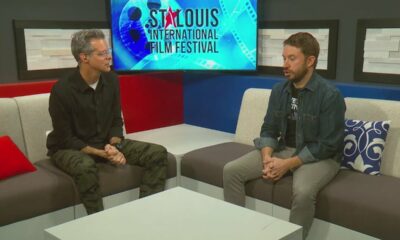Mississippi News
Jennifer Egan: Q&A with ‘The Candy House’ author
Q&A with ‘The Candy House’ author Jennifer Egan
Have you ever wanted to relive your old memories? What would it mean if you could?

In “The Candy House,” author Jennifer Egan imagines a technology — Own Your Unconscious — that allows users to upload all of their memories into a cube-shaped hard drive and review them with a headset. The technology evolves into the Collective Conscious, a shared database of memories anyone can access for the price of their own consciousness being added to the collective.
The novel exists in the same universe as Egan’s Pulitzer Prize-winning hit, “A Visit From the Goon Squad,” but shifts the focus to new characters and the way the Collective Conscious reshapes their life. “The Candy House” is also written in the same structure as its predecessor — each chapter is an individual unit with its own style, and chapters jump back and forth across time, but loosely connect.
Egan, who will be appearing as a featured guest at the Mississippi Book Festival Aug. 20, spoke with Mississippi Today about her newest work.
Editor’s note: This story has been edited for clarity and length.
Mississippi Today: I didn’t realize when I started it that “The Candy House” is a sort of sister novel to “A Visit From the Goon Squad” — another book to add to my reading list.
Jennifer Egan: I actually think that going in the direction that you’re going, starting with “The Candy House,” I think is optimal. It’s not a sequel, it’s just a related world.
MT: I’m curious, why do you think that’s optimal?
Egan: Well, I’ll back up a little, I had originally thought that “A Visit From the Good Squad,” would go in a backwards chronology. That ended up not working very well, so I ended up having no chronology, just organizing it around curiosity. But the reason I thought it would go backwards was that I was really delighted with the kind of unexpected surprise of, instead of saying, “Gee what’s gonna happen?” you’re saying, “Oh, what was that like?” So a kind of backwards pattern of curiosity, having curiosity be satisfied backwards instead of forwards.
I was very interested in that because there are all kinds of advantages that it gives the reader. The reader already knows the future, so the reader experiences the present with a particular character in a very different way than we do if we’re just wondering, “Gee, what’s gonna happen?” as the character is. That kind of relationship to time and narrative has been exciting to me from the very start. I couldn’t make it work in a straight backwards chronology, but it’s my general feeling that in books like this, finding out what did happen is as fun or more fun than finding out what will happen. That’s what makes me think starting with “The Candy House” would be more satisfying. It’s not a neat sequence. But I think that those surprises of hearing about events that came and went and then being plunged into the middle of them, that particular form of surprise and satisfaction is going to be more present going from “Candy House” to “Goon Squad” than the other way around.
MT: But in terms of the chronology of your experience of writing these books, you were choosing to return to this world, even if not really continuing the narrative that you had before. How did you decide to do that?
Egan: Well, another aspect of books constructed this way is that there’s no real end to them exactly. There’s a story arc in both books for sure, but because they’re such ensemble creations and each character has its own constellation of history, people, experience, et cetera, and new peripheral characters to be curious about and turn into major characters, there’s no clear end to it except the exhaustion of curiosity. That’s what would put an end to it, the exhaustion of my curiosity. That definitely had not happened after “Goon Squad.”
… Beyond just the kind of structural curiosity that is built into books like this, another reason that I think I was so eager to continue is that there’s a high failure ratio writing books like this. In other words, I would say about 50% of the first draft material that I created for both books really didn’t end up being viable. I think part of that is when you’re trying to take a different narrative approach every time, you’re going to strike out a lot. But what that means is sometimes I end up in a strange position of knowing things about my characters that the reader doesn’t know because I learned them in chapters that didn’t end up in the book. That’s sort of a strange feeling. Usually, in my books, I don’t know any more than I’m letting my readers know. I don’t withhold information. So that feeling of knowing things that the reader didn’t know led me to feel very naturally that this was stuff that I had to share in some way. These stories were not complete.
The final thing I would say is I really do love taking genres that are out there in the culture and using them to write fiction, and these kinds of books are a great way to do that. I wouldn’t want to have written an entire novel in Twitter at 140 characters, but it was a lot of fun to write one chapter like that. These books, if I can make them work, just become a really good vehicle for lots of development and experimentation on my own part.
MT: It sounds like a really exciting process personally that you work through when you’re building each chapter narrative and how they fit together.
Egan: It is. It’s a very intuitive process. It’s not cerebral — well, that’s not true. It’s an alternation between intuition and analysis. I rely on my intuition to come up with a very improvisational draft, and then I evaluate them very critically. That’s why 50% of it ends up on the cutting room floor, as they say. I take the best and try to work with that and shape it into something meaningful. So that’s my process. It’s an alternation, but I place a high value on intuition and improvisation. It’s where I get a lot of my best stuff.
MT: So, when you were saying that you were still curious about the characters 12 years ago, and that’s what drew you back to it — do you feel like you still have that curiosity?
Egan: I can’t totally tell, to be honest. There are definitely forms that I want to try. That list is still active — things that I haven’t done yet, or haven’t managed to pull off, frankly, that I hope I can. I am curious about certain characters, but I’m not sure the curiosity is at the fever pitch that it was after I finished “Goon Squad.” I think right now, I feel very eager to move away from the present day, which I did after “Goon Squad.” I wrote a historical novel set in the thirties and forties, which took a huge amount of research and was a very different kind of book told much more traditionally. Shipwreck, survival at sea, wartime, combat, I mean, it’s just really different. But I had written a bunch of first draft material for “The Candy House” before I kind of dove deeply into that book. This time, I think I’m going to move into writing about the past, possibly without dabbling anymore in these characters for a bit. I’m not quite sure why. I think part of it is writing about the present day feels inevitably like writing about technology, and I feel a little bit weary of that. I was after “Goon Squad” too, but more so this time.
MT: Well, technology plays a more central role in this book too.
Egan: And a more central role in our lives. That combination, I find it just wearisome in the end. I’m not anti-tech, I think that’s clear in this book, I take a pretty playful approach to it. It was a very useful tool, narratively, for me to engage with because it lets me do all kinds of things that I couldn’t have done otherwise. That was really how I arrived at the tech in the book. I did not start out with it. It was an invention that could do all the things I wanted it to do. But I also feel a real eagerness to move away from it, back to a time that I actually remember — no internet.
I was in my thirties before I ever got online. It’s really refreshing to imagine in the pre-internet period. It’s not that there’s anything wrong with the internet. It does a million things for us, and it was a big help to me imaginatively in “The Candy House”, but the fact that all roads lead there just closes off a lot of dramatic possibilities. If you think about movies that involve technology, we spend more and more time staring at people clicking away on computers, and that’s not interesting dramatically. So the pleasure of going back in time is the pleasure of more dramatic situations that would be ridiculous now because these problems would be solved in ten minutes online.
MT: So the issue you were more interested in exploring in this book was more about memory than the tech. The tech was kind of just a tool to reach that question. Would you say that?
Egan: Not exactly, but obviously memory is a big part of it. I was interested in enabling connections and shared experience between people that was impossible without the machine, but my awareness of the machine came about very incrementally. For example, one of the early chapters I wrote was “Rhyme Scheme.” In it, Lincoln is trying to figure out how to make his colleague fall in love with him and he very briefly considers the idea that he could view her consciousness — that term gray grab was very instantaneous. I remember the moment when I wrote it and I thought, “oh, I see, I get what that is.” He has a way of being able to see inside her consciousness, so there must be some sort of sharing possibility there. That was my first inkling of what the device would be. And it just comes and goes, because he considers it and then immediately disregards it because there is clearly an interdiction against that. But that’s the kind of little clue that I got.
Then a moment when things became really clear was when I wrote the chapter called “What the Forest Remembers.” I started out with Lou and his pals going on this adventure to the marijuana farm, and then there came a moment where Charlene says “How could I possibly know all this?” and that was a moment where the machine really crystallized for me.
“Ah, I get it. She’s using a device that lets her see memories through other people’s eyes.” That was so exciting to me because it let me do something that you really can’t do in fiction that easily, which is to justify being in two people’s first-person viewpoints at the same time. I mean, of course, you can kind of do anything in fiction, but I love the idea of a technology that enabled and justified that.
Once I defined the machine and was really leaning into the way people fetishize the color that their cube is and etcetera, I would sometimes imagine myself giving one of these cubes a big kick and just having it disappear. Inside, there’s just the book that we’re holding in our hands. Because in a way, what I’m doing in the book is moving through a collective of different points of view and memories as I move through my 14 characters’ points of view.
MT: The end of the book and that image both seem to be an inclination towards fiction over tech, which I’m sure is natural as a writer, but I was curious if you agree with that.Egan: I would say that, as a general matter, we should spend less time looking at pictures and more time engaging with language. It’s important to keep our brains fit and pictures don’t do that. It’s a very lazy way of consuming information. I think we all feel that. Does anyone feel good after spending two hours scrolling on social media? I would love to hear from that person …
I don’t include watching a movie in that lazy category, but reading is different from all of this because there are no pictures. We have to supply them. Reading is harder to do if you fall out of the habit of doing it. And I think that we would all, and I include myself in this, be well advised to pick periods of the day when our phones are not near us, and it’s amazing how quickly you forget about them actually.
… I think that reading books is really important, not only for our mental fitness — there is a kind of learning and experience that we can have reading if we are fit, that we can’t have looking at pictures. It’s a very simple fact that’s inarguable.
Fiction is the only narrative art form that takes us authentically inside the minds and points of view of other people. If you are staring at a picture, you are, by definition, having the opposite experience. You are on the outside, anything the human in that picture tells you is performative. So I would argue that fiction still does something no other narrative art form can do. And therefore, it is worth staying fit in order to be able to have that experience.
MT: Do you worry there will be a day when the machine that you imagined or something similar becomes real and the experience of fiction becomes less relevant?
Egan: I think that there are so many other things to be frightened of if that machine ever came to pass that the disappearance of books is almost not even on the list. My assumption was that such a machine could not exist because we don’t understand the brain well enough, but people have been telling me since “The Candy House” came out that I’m actually wrong and that we are closer to that than I think. That is truly horrifying.
And I have to say, I think if that happened, a kind of resistance of the sort I’m imagining actually could be the response — where people are so unwilling to be represented in this collective that they actually might consider as radical a step as shedding their identities and starting over. That actually becomes imaginable to me if there is an online collective that contains actual consciousness. Right now, it contains performative consciousness, and inadvertent consciousness in the form of all the information we don’t realize we’ve given up as the price of access to A, B or C. But I really cannot fathom that such a machine could exist. I just don’t think we understand the brain well enough to replicate it. If we can’t fix mental illness, if we can’t solve schizophrenia and still don’t even understand what causes it, how on earth could we externalize consciousness? I truly don’t believe it.
MT: That feels funny though, for people to have told you since the book was released, that the impossibility you’ve created on purpose is actually possible.
Egan: It is funny. But I will say this. Sometimes things that seem ludicrously impossible do come to pass, and that is something I’ve witnessed in my lifetime. Sometimes the ridiculous things do happen, but I share your feeling that this doesn’t even hold together as an idea if you look too closely, much to less a reality. One reason I think it feels so imminent is that to a certain degree, the internet already functions as a kind of collective consciousness, and that may be why all of this feels so possible. You can spend time on social media and learn an enormous amount about someone, far more than they probably realize. There is a collective of information. It’s not consciousness exactly, but it gets a lot closer to it than anything we’ve had before.
MT: This feels funny to say, in terms of this conversation — I don’t remember if this was something I thought to myself or something I read that someone else wrote, but reading “Candy House” feels a bit like an expanded version of scrolling through an Instagram feed. In a much more in-depth capacity, but because it’s an interconnected world, it’s like my interconnected circle of people who know each other and who overlap very loosely, and you’re like taking little snippets of each piece. Like, “Here’s a moment. And then here’s a completely separate moment, but it’s a little bit related, and here are the threads as to why.”
Egan: For sure. That’s to some degree intentional, in that I like the feeling of moving among consciousnesses as a way of moving among worlds. And I also connect that to gaming, something like dungeons and dragons where we move among pre-created worlds that are imaginative, but also have these hand-drawn corollaries.
I also want to say one more thing about what you said, “I’m not sure if I thought this or I read it,” which complicates our conversation a little bit — I would argue that consciousness is always collective to some degree. In other words, our individual consciousnesses consist of enormous amounts of shared understanding and cultural awareness that we share with everyone who is alive at this moment. We are always calling on knowledge that is not exactly “ours” originally but is in the culture around us. There’s nothing wrong with that.
There’s a lot of stuff that I don’t think of, that I don’t even know consciously, that ends up in my books. Names are one of the most obvious places that I see this. Here’s one example from “The Candy House” that was just pointed out to me recently: in the chapter called “Rhyme Scheme,” which is really where we first come to understand the sort of Orwellian future we’ve ended up in, there’s an important character in that in that chapter called O’Brien who ends up being the defier of this new reality. O’Brien is the name of the protagonist in George Orwell’s “1984”, but I had forgotten that. These sorts of name clues pop up again and again in my books. What they show is that I, like you, don’t know whether I thought of things or whether they were already in me from other things I had read and done, because consciousness is collective.
This article first appeared on Mississippi Today and is republished here under a Creative Commons license.
Mississippi News
Events happening this weekend in Mississippi: April 25-27
SUMMARY: This weekend in Mississippi (April 25-27) features a variety of events across Central and Pine Belt regions. Highlights include MiraGotSoul at Vibe Studio in Jackson, a community Dinner and Movie in Clinton, and the Natchez Kite Festival. Enjoy live performances with Sweet Lizzy Project in Natchez and the New Bourbon Street Jazz Band in Clinton. Family-friendly activities include the Native Plant Fest and Community Farmers Market in Jackson. In Hattiesburg, catch the Henry Cho tour and the Downtown Crawfish Jam Music Festival. Overall, it’s a weekend full of entertainment, culture, and fun activities for all ages.
The post Events happening this weekend in Mississippi: April 25-27 appeared first on www.wjtv.com
Mississippi News
Events happening this weekend in Mississippi: April 18-20
SUMMARY: This weekend (April 18-20), Mississippi offers a variety of events for all ages. In Jackson, enjoy Food Truck Friday, a jazz concert, free outdoor movie screenings, and multiple exhibitions including “Of Salt and Spirit” and “Hurricane Katrina: Mississippi Remembers.” For family fun, there’s an Easter Egg Hunt at the Ag Museum and “Bunnies & Butterflies” at MCM. Natchez features the Spring Pilgrimage, Lafayette’s 200th anniversary celebration, and a farmers market. In the Pine Belt, highlights include Live at Five, a Spring Candle-Making Workshop, and Easter events at the Hattiesburg Zoo. Don’t miss the Bluff City Block Party and more!
The post Events happening this weekend in Mississippi: April 18-20 appeared first on www.wjtv.com
Mississippi News
Events happening this weekend in Mississippi: April 11-13
SUMMARY: This weekend in Mississippi (April 11-13), enjoy a variety of events across the state. Highlights include the Eudora Welty Birthday Bash in Jackson, Trivia Night at the Mississippi Museum of Natural Science, and Boots & Bling Fundraiser in Natchez. For family fun, check out the Bunny Bonanza in Jackson or the Easter Egg Hunt in Clinton. The Natchez Concours d’Elegance Car Show and Stranger Than Fiction Film Festival offer cultural experiences, while the 12th Annual Dragon Boat Regatta in Ridgeland and the Hub City Classic Car Show in Hattiesburg provide exciting activities for all ages.
The post Events happening this weekend in Mississippi: April 11-13 appeared first on www.wjtv.com
-

 News from the South - Florida News Feed7 days ago
News from the South - Florida News Feed7 days agoJim talks with Rep. Robert Andrade about his investigation into the Hope Florida Foundation
-

 News from the South - Alabama News Feed5 days ago
News from the South - Alabama News Feed5 days agoPrayer Vigil Held for Ronald Dumas Jr., Family Continues to Pray for His Return | April 21, 2025 | N
-

 News from the South - Florida News Feed5 days ago
News from the South - Florida News Feed5 days agoTrump touts manufacturing while undercutting state efforts to help factories
-

 Mississippi Today6 days ago
Mississippi Today6 days ago‘Trainwreck on the horizon’: The costly pains of Mississippi’s small water and sewer systems
-

 News from the South - Texas News Feed6 days ago
News from the South - Texas News Feed6 days agoMeteorologist Chita Craft is tracking a Severe Thunderstorm Warning that's in effect now
-

 News from the South - Missouri News Feed22 hours ago
News from the South - Missouri News Feed22 hours agoMissouri lawmakers on the cusp of legalizing housing discrimination
-

 News from the South - Arkansas News Feed7 days ago
News from the South - Arkansas News Feed7 days agoAs country grows more polarized, America needs unity, the ‘Oklahoma Standard,’ Bill Clinton says
-

 News from the South - Florida News Feed5 days ago
News from the South - Florida News Feed5 days agoFederal report due on Lumbee Tribe of North Carolina’s path to recognition as a tribal nation

















































